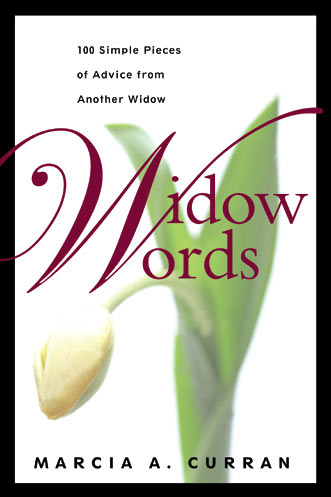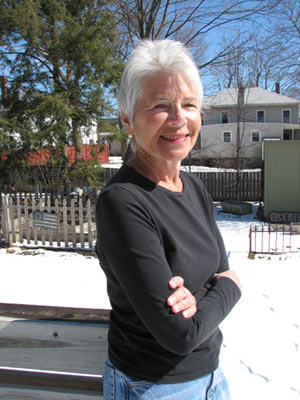For New Widows
Unique Book Makes a Loving Gift of Empathy
When a husband has died, the new widow’s world is shaken to the core. It doesn’t matter how “independent” or “dependent” the relationship may have seemed to others. When a marriage ends because the husband has died, the wife will grieve in ways no one else can know. No one else except another widow.
 “There are no words to describe waking up the first morning after your husband has died and thinking I’m a widow. How can this be? What am I going to do?” writes Marcia A. Curran, author of Widow Words: 100 Simple Pieces of Advice from Another Widow. “Some inner strength gets you through . . . but the days, weeks, and months afterward are full of unrelenting see-saws of emotions. I know how you feel because I had the same feelings when my husband died.” “There are no words to describe waking up the first morning after your husband has died and thinking I’m a widow. How can this be? What am I going to do?” writes Marcia A. Curran, author of Widow Words: 100 Simple Pieces of Advice from Another Widow. “Some inner strength gets you through . . . but the days, weeks, and months afterward are full of unrelenting see-saws of emotions. I know how you feel because I had the same feelings when my husband died.”
 Curran is a journal writer. Having kept a journal for years, it was natural for her to continue writing journal entries after her husband died. Her book distills the most helpful ideas from those entries to help other new widows get through the first few days, months, even years of life without their partners. Curran is a journal writer. Having kept a journal for years, it was natural for her to continue writing journal entries after her husband died. Her book distills the most helpful ideas from those entries to help other new widows get through the first few days, months, even years of life without their partners.
 “Each thought, idea, and practical suggestion,” continues Curran, “has been personally experienced by me. I am not a doctor or a grief counselor. I am a widow who loved and lost her husband.” “Each thought, idea, and practical suggestion,” continues Curran, “has been personally experienced by me. I am not a doctor or a grief counselor. I am a widow who loved and lost her husband.”
 For the recently widowed, one idea per page may be all they can read and take in just now. Widow Words offers 100 pieces of advice, one idea per page. The thoughts range from practical advice to bittersweet humor. They are the thoughts that only another widow could come up with to help at this time of personal turmoil. Simplicity and empathy define the entries. Here are some short examples: For the recently widowed, one idea per page may be all they can read and take in just now. Widow Words offers 100 pieces of advice, one idea per page. The thoughts range from practical advice to bittersweet humor. They are the thoughts that only another widow could come up with to help at this time of personal turmoil. Simplicity and empathy define the entries. Here are some short examples:
 Sell his truck (or car). Even the neighbors feel sad looking at it. Sell his truck (or car). Even the neighbors feel sad looking at it.
 Investigate all funny noises in your home. You won’t think it’s so funny when the hot-water tank leaks onto your rug… Investigate all funny noises in your home. You won’t think it’s so funny when the hot-water tank leaks onto your rug…
 The salesperson at the makeup counter will help you make the right choice on lipstick. Splurge. The salesperson at the makeup counter will help you make the right choice on lipstick. Splurge.
 There is no law saying you can’t keep your side of the bed even though you can have either side now. There is no law saying you can’t keep your side of the bed even though you can have either side now.
 “I believe there is a special place for this book,” says grief counselor Marta Felber. “Two weeks after my husband died, a friend sent two of C. S. Lewis’s books. They sat on my shelf for months, unopened, until I could focus on his words. If only Widow Words had been available to me in the early days! I know I would have read many pages, and used chosen messages immediately.”—Marta Felber, grief counselor, widow and author, Finding Your Way After Your Spouse Dies and Grief Expressed When a Mate Dies. “I believe there is a special place for this book,” says grief counselor Marta Felber. “Two weeks after my husband died, a friend sent two of C. S. Lewis’s books. They sat on my shelf for months, unopened, until I could focus on his words. If only Widow Words had been available to me in the early days! I know I would have read many pages, and used chosen messages immediately.”—Marta Felber, grief counselor, widow and author, Finding Your Way After Your Spouse Dies and Grief Expressed When a Mate Dies.
# # #
Marcia A. Curran is a journal writer, a mother, a grandmother, and a recovered widow whose husband died at age 56. She lives near Boston, MA.
To request a review copy of Widow Words, to arrange an interview with the author, or to have cover art sent electronically, please contact Kate Bandos at KSB Promotions:
800-304-3269 or 616-676-0758; fax 616-676-0759; kate@ksbpromotions.com
Widow Words
100 Simple Pieces of Advice from Another Widow
by Marcia A. Curran
Self-Help / Grieving
112 pages; 5.5 x 8.25; ISBN: 978-1-889242-33-0 / ISBN-10: 1-889242-33-0
$15.95 jacketed hardcover, pub date July 2007
Published by VanderWyk & Burnham, www.VandB.com
Distributed by National Book Network, Inc. (NBN)
Widow Words is available at bookstores nationwide, online, and at www.VandB.com or call 800-789-7916.
Please send two copies of any review or mention to
VanderWyk & Burnham; P.O. Box 2789; Acton, MA 01720-6789
|
 Sell his truck (or car). Even the neighbors feel sad looking at it.
Sell his truck (or car). Even the neighbors feel sad looking at it. Investigate all funny noises in your home. You won’t think it’s so funny when the hot-water tank leaks onto your rug…
Investigate all funny noises in your home. You won’t think it’s so funny when the hot-water tank leaks onto your rug… The salesperson at the makeup counter will help you make the right choice on lipstick. Splurge.
The salesperson at the makeup counter will help you make the right choice on lipstick. Splurge. There is no law saying you can’t keep your side of the bed even though you can have either side now.
There is no law saying you can’t keep your side of the bed even though you can have either side now.
